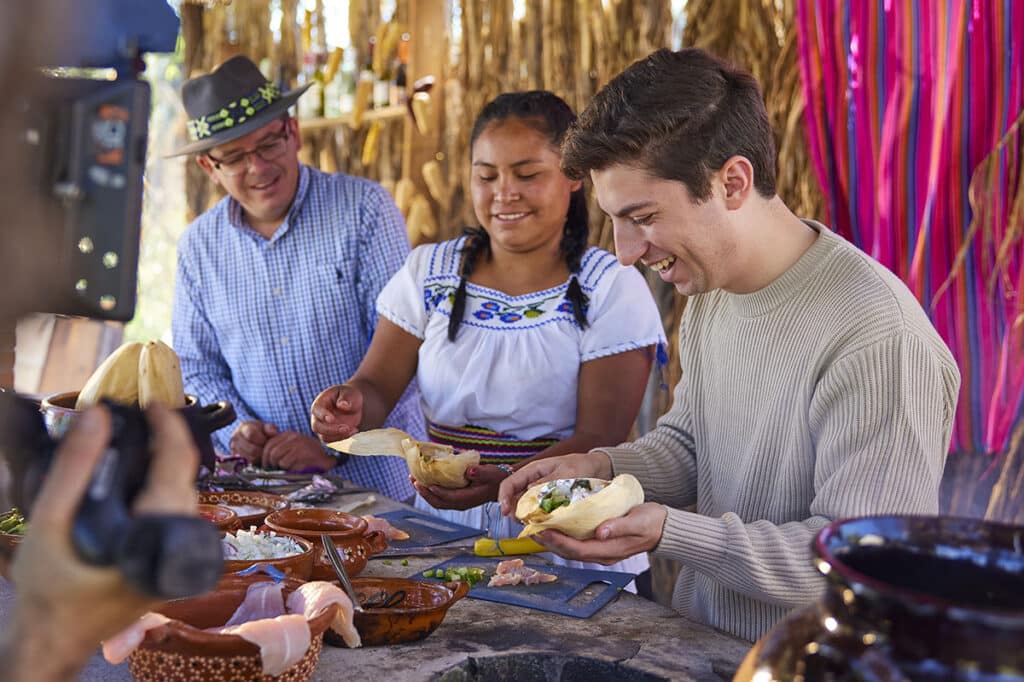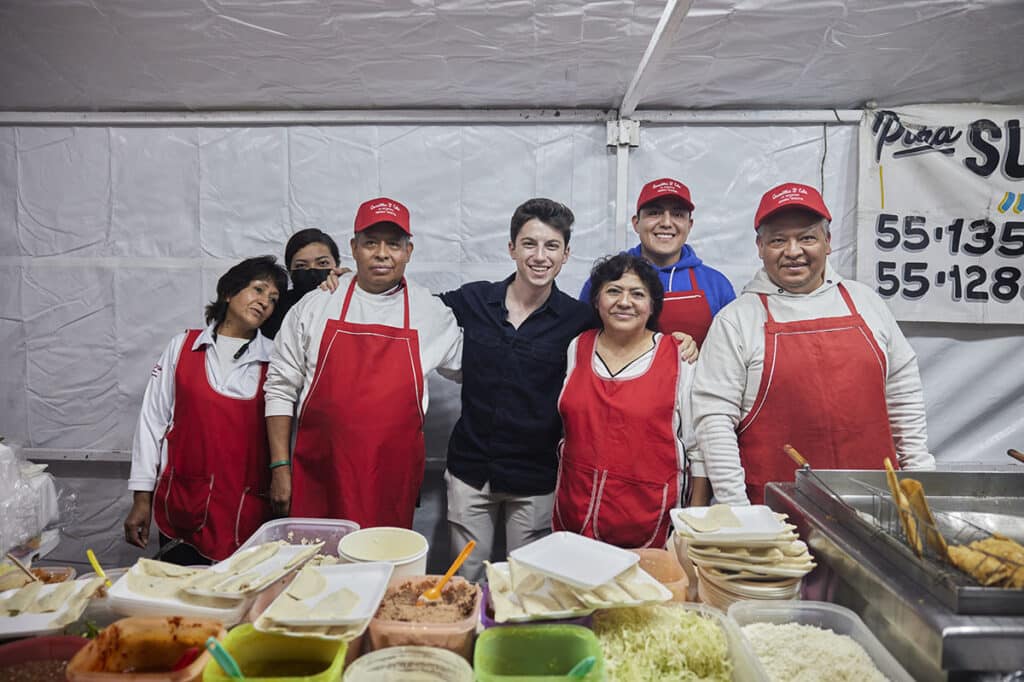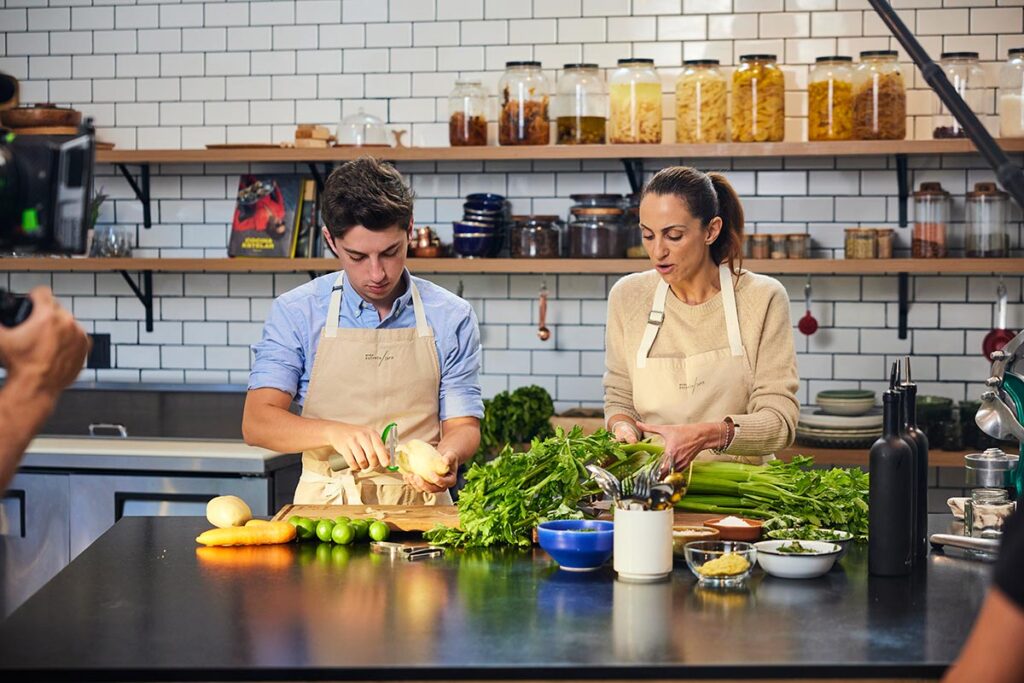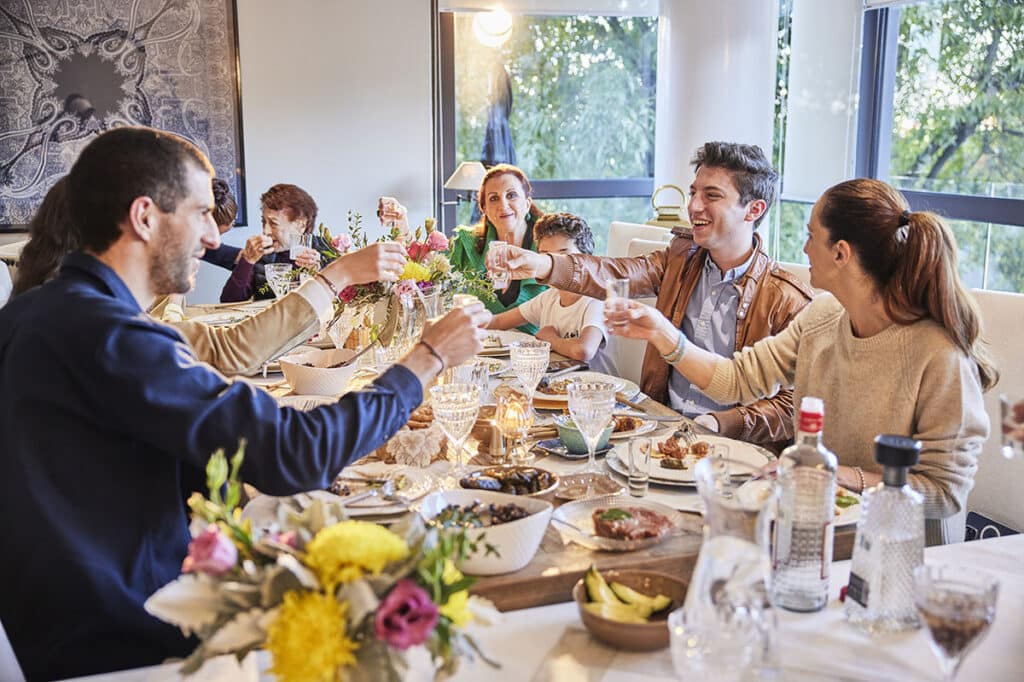
Eitan Bernath is shedding light on an underrepresented part of the Jewish community in his new social media cooking series.
Bernath, who boasts 2.3 million TikTok followers and 680,000 Instagram followers, dives into Mexican Jewish culture and cooking in his new video collection with Tastemade.
Despite having a sizable Jewish community of 100,000, Mexican Jews are often not represented in the media. The seven-part “Eitan Explores: Mexico City,” released May 13, follows the culinary star as he learns more about Mexican Jewish culture, cooks classic Jewish-Mexican cuisine and spends Shabbat in Mexico City.

Unpacked spoke with the 22-year-old about his love for Jewish cooking, why he wanted to learn more about the Mexican Jewish community, and his experience as a Jewish social media influencer.
Eitan Bernath’s Jewish identity is deeply tied to his relationship with food
Since Bernath began his culinary career when he was 11 and competed on “Chopped,” his Judaism has been an integral part of his cooking.
His blog and Instagram consistently feature Jewish cuisines from across the world, and he frequently discusses his Jewish identity, whether hosting Shabbat dinner or prepping for a holiday. Bernath told Unpacked that it wasn’t a conscious decision to meld his Judaism into his content; rather, his page is an extension of his identity, and Jewish dishes are a large part of his culture.
“My Jewishness is a part of who I am, so it naturally got incorporated. As time has evolved, it’s something that I now do more intentionally and thoughtfully. But obviously I’m Jewish, so I’m going to document the Jewish parts of my life,” he said.
Many of Bernath’s favorite family memories involve his family gathered around the table for Jewish holidays. One of his most cherished memories is when his grandfather scared a raccoon outside their sukkah with their matzah ball soup ladle. These moments, he believes, have ingrained Jewish cooking as a grounding force in his life.
“Judaism and food are very ritualistic. And I think that for me is partly why I’m so connected to food. I just think it’s such a pivotal part of Jewish life,” Bernath said.
Jewish culinary traditions take a variety of forms
Bernath remarked that Jewish cooking is a great way to learn about Jewish history since communities would blend their food with that of the region and bring many of those traditions with them once the Jewish people were expelled from an area.
“Jewish food is a really great vehicle for telling Jewish history,” he said. “The history of Jewish food truly shows how nomadic the Jewish people have been.”
All cultural dishes have a history and a specific reason for their creation, Bernath said.
Bernath said that if one is looking to feel more connected with their heritage, cooking is a great entry point, as it allows for sharing with loved ones and experiencing the same cuisines as those who came before them.
“Cooking is a great way to connect with your culture. Food always tells a story. Being able to connect with other Jews through food, even though my ancestors never ate Mexican Jewish food, is really amazing. Especially since I got to see what Judaism is to other people,” he said.
Modernizing Jewish cooking to fit contemporary trends, he added, is just another development in the culinary tradition.
“It’s important to continue to modernize Jewish cuisine just because it’s just what we do as Jews, and I think it’s just a continuation of the evolution of Jewish cuisine,” he said.
Bernath was interested in doing the series to expand peoples’ horizons on what Jewish food could look like
Since Spain began to colonize Mexico, Jews have lived in that area of North America. Notably, in 1567, nobleman Luis de Carvajal welcomed conversos (Jews who were forcibly converted to Catholicism during the Inquisition and practiced in secret) to his land just north of New Spain. It is believed that 75% of the settlers were conversos.
Spanish and Portuguese conversos had greater freedoms in Mexico than in Europe. The King of Spain ended the Mexican Inquisition in 1606, encouraging a migration of Sephardic Jews to the colony in the 17th century.
The largest spike in Jewish immigration took place from the 1880s to the early 1900s when the Mexican government encouraged Russian Jews and Ashkenazi Jewish bankers to come to Mexico City. Around 50% of Mexico’s population descends from these immigrants.
During the same period, Sephardic and Mizrahi immigration also increased as people fled the struggling Ottoman Empire and Syria. The Jewish population spiked even more when the United States imposed immigration quotas in 1921.
“In Mexico City there are Ashkenazi Jews, Mizrahi Jews and Sephardi Jews, but they’re all very intertwined communally and they really embrace Jewish food. They have an interesting story of still cooking their traditional dishes from Europe and the Middle East while adding Mexican ingredients,” Bernath said.
For example, when he spent Shabbat with a Mizrahi Mexican family, they made sour kibbeh stew. While the soup is traditionally made with tamarind, this family used limes instead to create the sour flavor. Foods like tabouli, kibbeh and avocado were eaten alongside each other at the Shabbat table.
“It’s truly a beautiful story of sticking to their heritage and their cuisine from where they’re from, but also really embracing the new country they live in and its food,” Bernath said.
The chef felt it was important to film a series in Mexico to encourage viewers to learn more about the country’s Jewish community. Across the Jewish world, what a Jew “looks like” varies greatly, as Jews come from all regions. In Ethiopia, for example, the equating of Jews with whiteness, which many in the U.S. work to dispel, is unfamiliar because the Jewish community there tends to be Black.

“It’s important to highlight the diversity within the Jewish community. In America, people often think of Jews as only Ashkenazi. There are vast segments of the Jewish population who are not European and it’s beautiful. As an Ashkenazi Jew, I feel it’s incredibly important to showcase this diversity because historically, Ashkenazi Jews are more frequently seen in media,” Bernath said.
“Eitan Explores: Mexico City” allowed Bernath to learn more about the Mexican Jewish community
Throughout the series, the culinary star explores what differentiates Mexican-Jewish cooking and how it combines elements of Mexico with the diverse Jewish community that settled in Mexico City.
Much like in the United States, the Mexican-Jewish community blended their practices with traditional Mexican cooking. Bernath visited delis and synagogues prominent in the Jewish community and highlighted the variety of dishes and ingredients.
For example, the taco stand Bernath featured is vegetarian because the non-Jewish owner realized that Jewish residents needed kosher options in Mexico City.
Bernath visited with Mexico City native Pati Jinich before his trip, where they prepared Gefilte Fish a la Veracruzana, a dish that combines her family’s Mexican and Ashkenazi heritages.
He also learns and prepares a variety of different meals throughout the show, including kibbeh soup for a Shabbat sobremesa, a time for loved ones to catch up before sundown. Bernath travels to a market with Mexican Jewish chef Estrella Jafif to buy the ingredients for their Shabbat meal, hamout, a Lebanese lemon and potato soup.

Preparing his Shabbat meal with Jafif is the experience Bernath most enjoyed during his time in Mexico City.
“That Shabbat meal was so special,” he said. “I’ve traveled all over the last few years and have met Jews and visited synagogues all over the world. I think it’s truly incredible how you can meet someone and have nothing in common other than being Jewish, but that still brings you together”.
“To be welcomed into [Jafif’s] home and into the very intimate ritual they do every week of having their family meal was really special.”

Being Jewish online can be incredibly stressful
Since Bernath entered the public eye at a young age, his adolescence has been watched by millions worldwide. He feels a responsibility to reflect his Jewish identity in a positive light because, for many of his viewers, he is their only Jewish representation.
“There are hundreds of thousands of people for whom I might be the only Jewish person they know of and have as part of their daily life, and so I take that as definitely a sense of responsibility that, for good or bad, my actions can shape how someone thinks what a Jew is,” Bernath said. However, given the diversity within Judaism, Bernath acknowledges that he cannot reflect all types of Jewish practice. Jewish fans have commented that he is not cooking something the way they do or practicing in the “correct” way, as every family’s traditions may look different.
Especially in light of Oct. 7, the amount of antisemitic hatred the content creator has received online has increased significantly. In the weeks following the start of the war in Israel, he received targeted threats for being a proud Zionist and antisemitic comments to the extent that he had to hire security.
Despite the hate, Bernath has remained undeterred in sharing his Judaism and love for Israel. He doesn’t care if people who disagree with him unfollow because it will not change his stances.
“When you work in the public eye, there are so many different causes or things that you can choose to support, and there are ones that are like trends. I’m going to be Jewish till the day I die. And so for me, it is always worth it every single time to stand up for the Jewish people because it’s not a fad. This is something that will follow me for the rest of my life,” he said.

